AM/FM Radio Makes Facebook Ads Better
CUMULUS MEDIA | Westwood One recently commissioned a MARU/Matchbox survey of our affiliate partners in unrated markets, a group made up of AM/FM radio station owners, general managers, and sales managers, to understand marketplace challenges. Specifically, we sought to uncover which competitive media AM/FM radio stations in these markets face most.
By a significant percentage, Facebook topped all other media options. Second place went to social media.
Facebook is huge and for media plans, it isn’t going away. Fortunately, there are three ways AM/FM radio makes Facebook ads work better:
Massive reach: AM/FM radio adds new, different audiences of people that Facebook cannot reach
Facebook is a widely used social media platform, leading with 61% of Americans. However, according to Edison Research’s 2019 Infinite Dial study, there has been a -9% loss of users since 2017 among persons 12+ (67% in 2017 to 61% in 2019). With an estimated decline of 15 million users, Facebook ads are reaching fewer people.
Facebook’s losses are most prevalent among younger Americans. Among persons 12-34, Facebook’s audiences have eroded -22% since 2017. Among persons 35-54, users dropped -4%. Only among persons 55+ has Facebook seen +8% user growth since 2017.
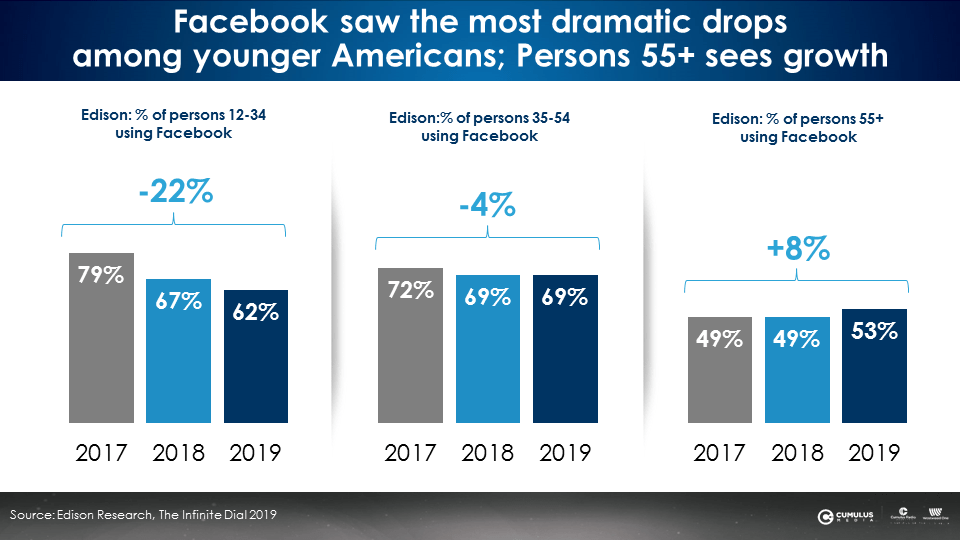
AM/FM radio can reach consumers not reached by social platforms
- AM/FM radio reaches 30% more 18-34 Millennials than Facebook
- Among 25-54s, AM/FM radio outreaches Facebook by 39%
AM/FM radio’s 96% monthly reach among Millennials is not just greater than Facebook (74%) but all social platforms including Instagram (53%), Snapchat (44%), Twitter (29%), Pinterest (29%), LinkedIn (20%), and Yelp (13%).
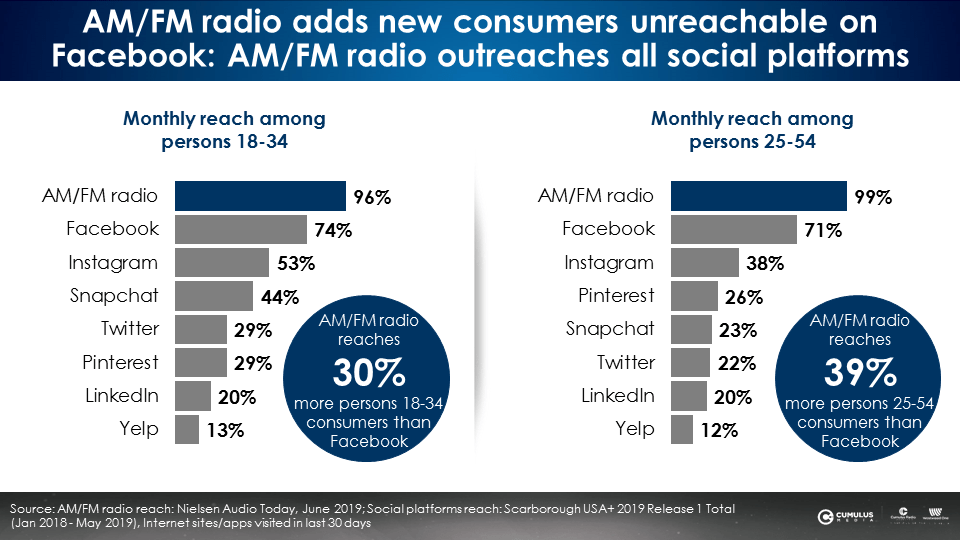
Ads stand out: AM/FM radio ads are noticed more than Facebook ads
According to MARU/Matchbox study commissioned by the IAB, spoken word content like news and weather generate the highest levels of concentration among respondents. Concentration with news and weather is 1.5X greater than concentration with social media.
Listening to music, a major AM/FM radio activity, also sees higher levels of concentration (51%) than when checking social media (44%). Ads running on AM/FM radio are noticed more because people concentrate more on the AM/FM radio content.
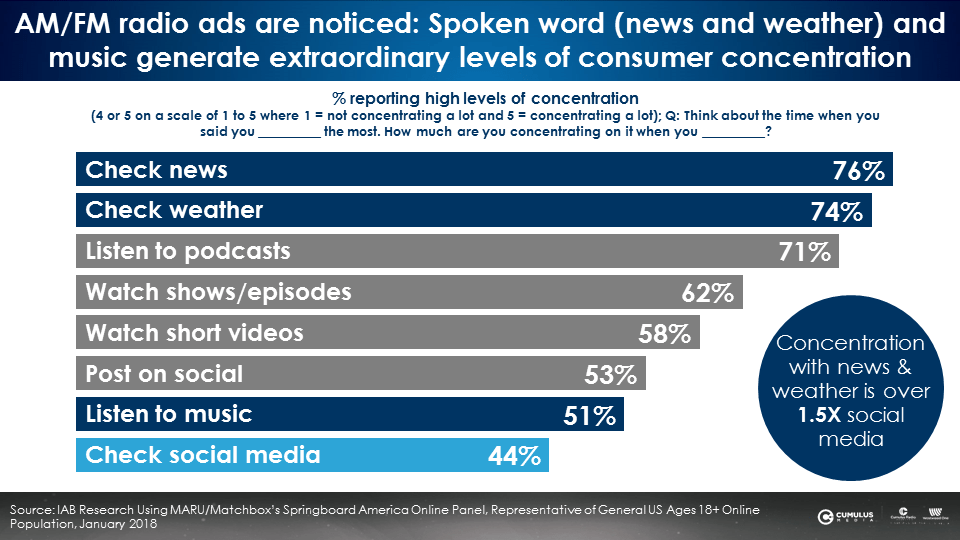
AM/FM radio ads resonate more since AM/FM radio content is more engaging than social media
Engagement value tells the same story. According to the IAB study, news and weather are the most engaging types of content, each at 79%. Music and podcasts follow, each with 76%. Checking social media generated the lowest levels of engagement at 39%. Social media, an activity largely reduced to scrolling, is not nearly the lean in media experience as AM/FM radio. AM/FM radio works better because the audience is more engaged with the content.
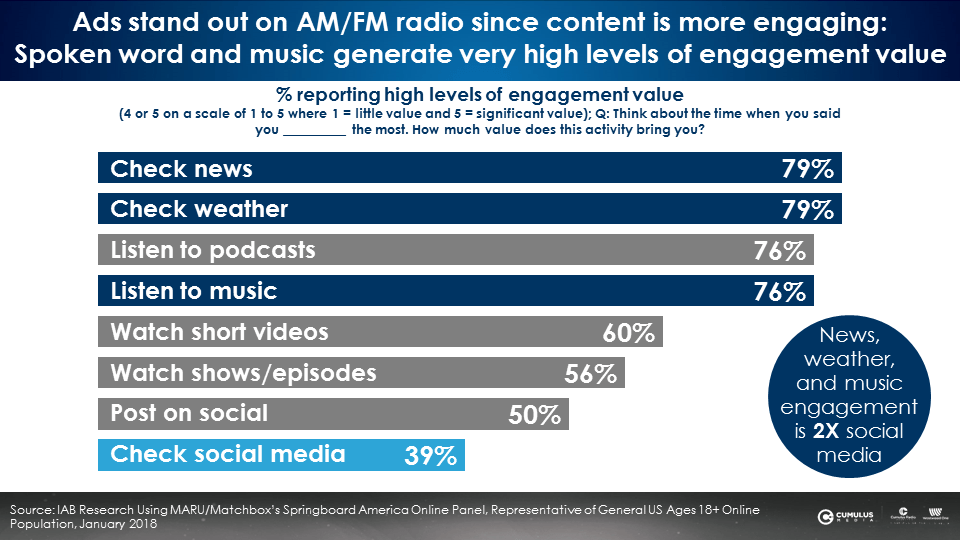
AM/FM radio ads work better because they are exposed more frequently
Americans spend nearly twice as much time listening to AM/FM radio than they do on social media, exposing themselves to AM/FM radio ads more frequently than Facebook. According to Nielsen’s Total Audience Report, persons 25-54 spend an average of 1 hour and 41 minutes with AM/FM radio daily, 1.7X more time than they spend with social media on a smartphone. Despite constant buzz about social media in the marketplace, ads on AM/FM radio are going to have more of an impact due to higher exposure frequency. The more time spent with AM/FM radio, the more times Americans will hear an AM/FM radio ad.
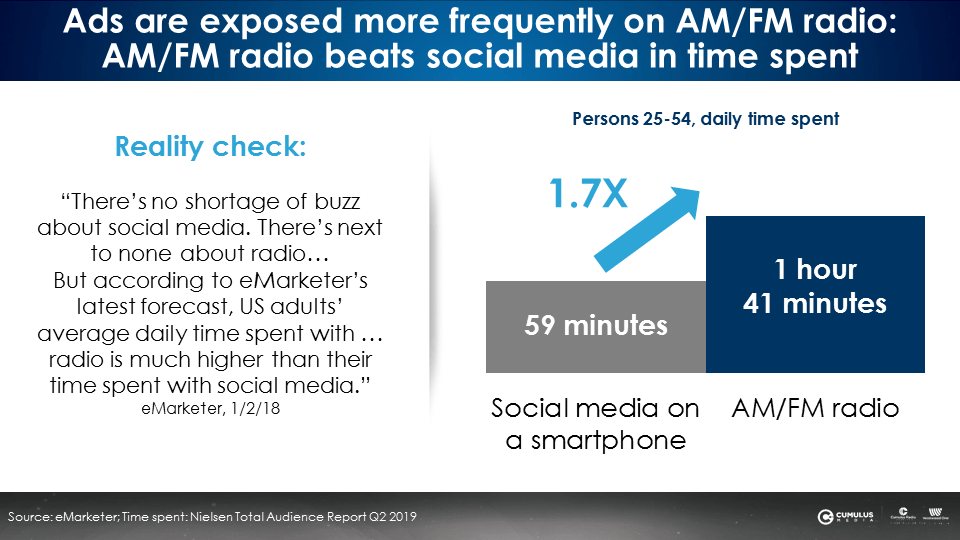
Facebook + AM/FM radio = better impact
- Increased reach: AM/FM radio adds new, different audiences that Facebook cannot reach.
- Ads stand out: AM/FM radio ads are noticed more than Facebook ads. AM/FM radio is far more engaging than social media.
- More frequency: Ads are exposed more frequently on AM/FM radio than Facebook. Americans spend nearly twice as much time listening to AM/FM radio daily than they do on social media.
Pierre Bouvard is Chief Insights Officer at CUMULUS MEDIA | Westwood One.
Contact the Insights team at CorpMarketing@westwoodone.com.